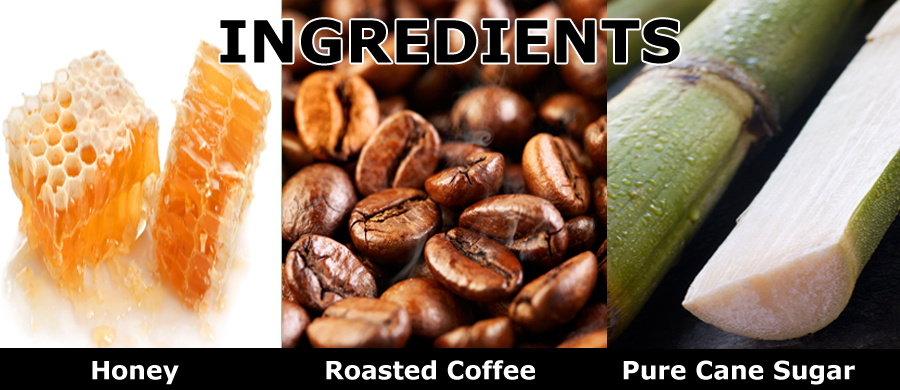GO! Benefits

GO! is a combination of honey, coffee beans and natural sugars designed to deliver energy quickly and maintain it. We add nonfat milk for flavor.

Our goal is to make our GO! products as healthy as possible. The benefits of coffee and honey have been known for over a millennium and have been included in many religions. In the last century poorly conducted research which did not differentiate between lifestyles of coffee drinkers, such as smoking or being sedentary, has created confusion.
When coffee beans were first discovered in Ethiopia man ate them before he learned to boil them. The legend of Kaldi, the Ethiopian goat herder, and his dancing goats is well known. The story of the monks that ate them may not be.
We believe eating the fruit is more beneficial then drinking the juice.
Following this theory we use a combination of roasted arabica and robusta beans to maximize flavor and caffeine levels. A pinch of our product is equal to a strong cup of coffee. In a container of GO! Coarse you conservatively get 5 cups of coffee while in a tin of GO! Fine 4 cups.
We use honey to deliver energy quicker and to compliment the caffeine. Our honey is obtained from well reputed US farmers to ensure quality.
Pure cane sugar is used to supplement the honey and increase the effectiveness of the caffeine in the coffee. Like honey, it also increases mental alertness quicker than caffeine.
Go Coffee Energy – Ingredients
GO! ingredients are as basic as your cup of coffee. We use a combination of coffee beans for caffeine and natural sugars to deliver energy quickly and maintain it. Nonfat Milk is added for flavor.
- Coffee – Arabica and Robusta beans to maximize caffeine.
- Honey – 100% US for quick and lasting energy plus health benefits.
- Pure Cane Sugar – for quick, natural energy.
- Nonfat Milk- for flavor
*Manufactured in a facility where allergens may be present.

Go Coffee Energy – How to use
Put a pinch between your cheek and gum, chew it, or however you may like.
GO! Benefits GO! was designed to use the best of Mother Nature to give you the energy to get it done.
- Improves Performance: Mind and Body1
- Energizes Quicker – Caffeine enters the blood stream quicker through the mouth then the stomach.2
- Speeds up Metabolism and Suppresses Hunger 3
- Rich in Antioxidants – Coffee provides more antioxidants than any other food or beverage in the American diet.4
- Mild Diuretic5
- Protects against Type 2 Diabetes, Liver Cancer and Cirrhosis, and Parkinsons.6
- Minimizes Migraine Headaches and Allergies 7
- Tobacco Alternative
References
- “Caffeine for the Sustainment of Mental Task Performance: Formulations for Military Operations”;
Committee on Military
Nutrition Research, Food and Nutrition Board; 2001
www.nlm.nih.gov
Tufts University; Caffeine Modulates Attention Network Function; Tad T. Brunye, et. al.
http://www.sciencedaily.com? /releases/2010/11/101123101751.htm
Med Sci Sports Exerc. 2008 Oct;40(10):1841-51.
Psychopharmacology (Berl). Nov 2004;176(3-4):320-30.
Appl Physiol Nutr Metab. Dec 2008;33(6):1319-34.
Aviat Space Environ Med. Aug 2004;75(8):666-72.
Aviat Space Environ Med. Sep 2004;75(9):771-6.
Ann Nutr Metab. 2010;57 Suppl 2:26-35.
J Strength Cond Res. Jan 2009;23(1):315-24.
Am Fam Physician. Nov 1 2008;78(9):1039-46. - International Journal of Pharmaceutics 234 2002 159–167
Eur J Appl Physiol. Dec 2010;110(6):1243-50. - Glade, M.J. The Nutrition Doctor, Skokie, Illinois, USA. Nutrition, 2010 Oct;26(10):932-8.
Mayo Clinic; Does Caffeine Help with Weight Loss; Katherine Zeratsky - Journal of Agricultural and Food Chemistry 2005 Apr 6;53(7):2658-2663
- June 2002 in The International Journal of Sport Nutrition and Exercise Metabolism
- 2010 issue of The American Journal of Clinical Nutrition Coffee Health Benefits (March 15)
Hepatology. 2008;48:7-9, 129-136.
www.nlm.nih.gov; Does coffee protect against liver cirrhosis?; Gallus S, Tavani A, Negri E, La Vecchia C.
www.nlm.nih.gov; study of caffeine consumption and risk of Parkinson’s disease;
Ascherio A, Zhang SM, Hernán MA,Kawachi I - The Migraine Brain, by Dr Carolyn Bernstein and Elaine McArdle

